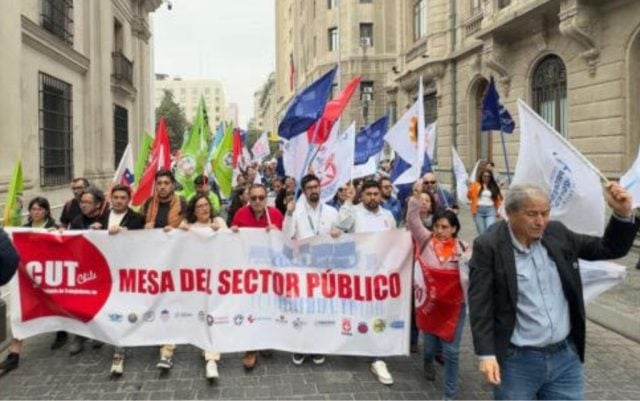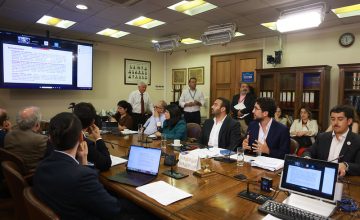Original article: “Justicia económica y estabilidad laboral”: Mesa del Sector Público entrega pliego 2025 para más de 900 mil trabajadores
With a call for «economic justice and job stability» for over 900,000 public employees, the Public Sector Council—led by the Central Unitaria de Trabajadores (CUT) and comprising 16 state workers’ organizations—formally submitted its 2025 Negotiation Document to the Ministry of Finance, kicking off the annual process for wage adjustments and improved working conditions in the final year of President Gabriel Boric’s administration.
The document outlines a comprehensive set of economic, labor, and leveling demands that unions deem crucial in the current political and fiscal landscape.
Laura San Martín, the coordinator of the Council, emphasized that the petition aims for «economic justice and job stability» for the more than 900,000 workers in the sector, setting the agenda for what they describe as a «decisive» negotiation.
Economic Demands: A Real Adjustment «Without Exclusion or Regime»
Among the key demands is a real wage adjustment of 2% for the period December 2025 to November 2026, applicable to all labor systems within the State, including contractors, municipalities, state universities, and local education services (SLEP).
San Martín stated that this adjustment should be applicable to all public sector workers without exclusion.
«This demand aligns with our responsibility and contrasts sharply with the exorbitant profits seen in banking and retail,» she noted in comments reported by Radio y Diario U. de Chile.
Furthermore, the document proposes minimum wages for various positions: $591,483 for aides, $658,265 for administrative staff, and $700,241 for technicians. Additionally, it demands a monthly bonus of $63,502 for all workers earning less than $798,015 before taxes.
Universalization of Pending Benefits and Labor Rights
A fundamental aspect of the proposal is the call for universal coverage of bonuses, vacation pay, educational support, and the end of negotiations, eliminating exclusion criteria that, according to organizations, particularly impact workers governed by special laws, SLEP, and in the municipal sector.
“Universal coverage of benefits and the end of precarious work is our priority,” San Martín emphasized.
Alongside economic matters, the Council highlighted the urgency of addressing outstanding labor issues. These include repealing the cause for vacancy due to incompatible health, strengthening job stability through tenure, fulfilling agreements on mental health, childcare, safety, and retirement incentives, and presenting a clear proposal to implement a 40-hour workweek in the public sector.
Concern Over the Fiscal Context
From the Teacher’s College, a member of the council, its president, Mario Aguilar, expressed concern regarding the fiscal backdrop of this process. “We see concerning signals,” he said, specifically noting that the 2025 Budget proposal does not account for a wage adjustment in the public sector.
This, Aguilar warned, could be interpreted as aiming for a zero adjustment, which practically equates to a reduction in salaries. He remarked that “a raise below the inflation rate would be absolutely unacceptable,” and stated that “this should be the baseline for discussions.”
In Aguilar’s view, the country’s growth “must be reflected in the workers and not just among the large economic powers.”
He highlighted that this is a “common petition demanding respect and dignity for public work.” Teachers are public workers, and today there is a well-orchestrated campaign to denigrate and discredit that role.
In the same vein, CUT vice president and sector leader Gabriela Farías reinforced criticism regarding treatment of public employment.
“The image of public officials has been tarnished, and we cannot allow this,” she stated.
She pointed out that both the executive and parliament must be “up to the moment” in responding to a petition she described as “fair and long-awaited.”
Call to Mobilize: «The Strength of Our Negotiation Lies in Unity»
The organizations made it clear that this process will be crucial, coinciding as it does with the final year of President Boric’s administration.
“We face the last negotiation process with this government, and we will not allow any backtracking,” warned coordinator Laura San Martín.
At the end of the delivery event, leadership called on their members to stay mobilized and united, emphasizing that “the strength of our negotiation lies in unity.”
The government, via the Ministry of Finance, will formally respond to the petition on December 4, after which dialogue and negotiation sessions are expected to commence to determine the working conditions for nearly one million state employees for the following year.










